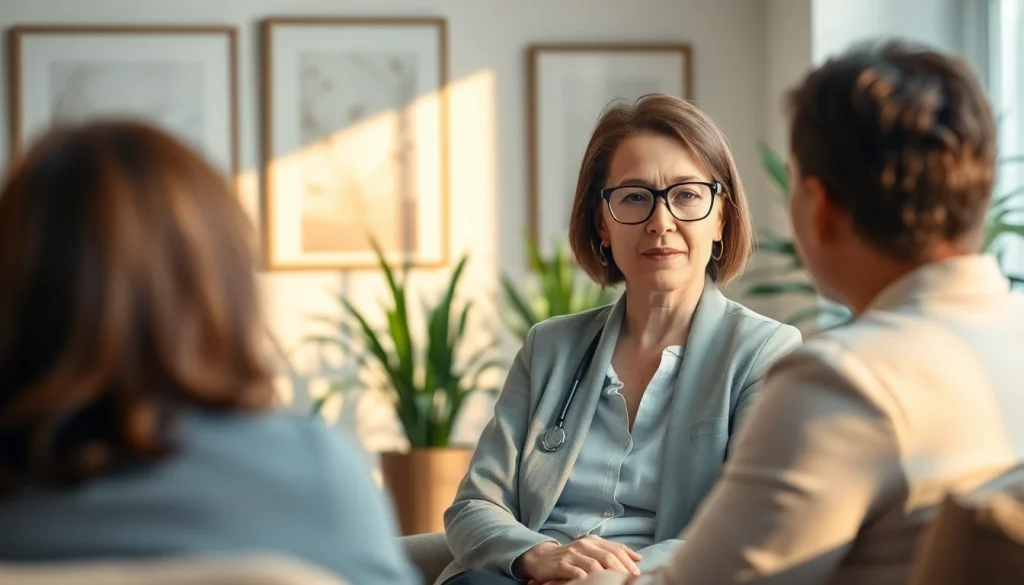Understanding the Role of an Attachment Theory Specialist in Healing Relationships

The Fundamentals of Attachment Theory and Its Importance
Attachment theory provides a crucial framework for understanding how our early relationships shape our emotional development and influence our interactions and connections with others throughout our lives. Originating from the pioneering work of John Bowlby and Mary Ainsworth, attachment theory posits that the bonds we form with our primary caregivers can significantly impact our behaviors, emotional regulation, and relationships in adulthood. Exploring this theory can greatly enhance our self-awareness and lead to healthier relationships, particularly when seeking guidance from an attachment theory specialist.
What is Attachment Theory?
Attachment theory is grounded in the observation that children develop specific styles of attachment with their primary caregivers. These attachment styles can influence their social, emotional, and cognitive development. The theory identifies four primary attachment styles:
- Secure Attachment: Characterized by a healthy balance of dependence and independence, individuals with secure attachment typically have positive self-esteem and strong interpersonal relationships.
- Avoidant Attachment: Individuals with an avoidant attachment style often minimize emotional connection and maintain distance from others. They may struggle with intimacy and often prioritize self-sufficiency.
- Anxious Attachment: Those with an anxious attachment style tend to have heightened sensitivity to relationship dynamics and often fear abandonment. They may exhibit clinginess or dependency issues in relationships.
- Disorganized Attachment: This style may emerge from trauma or inconsistent caregiving experiences, leading to a lack of strategy in managing relationships and heightened feelings of confusion and anxiety.
Key Concepts in Attachment Theory
Understanding attachment theory involves recognizing several key concepts:
- Internal Working Models: These are mental models individuals create based on their experiences with caregivers. They shape expectations about relationships and influence behaviors in adulthood.
- Attachment Behaviors: These are behaviors that individuals exhibit to seek closeness and reassurance from attachment figures, such as crying, smiling, or reaching out for physical contact.
- Attachment Across the Lifespan: Attachment styles established in childhood carry into adulthood, impacting both romantic and platonic relationships.
The Impact of Attachment on Relationships
Attachment styles profoundly influence how individuals approach relationships. For example, secure individuals tend to have healthier, more fulfilling relationships, while those with anxious or avoidant attachment styles may face challenges in their interactions. The way we communicate, express affection, and handle conflicts is often rooted in our attachment history. Recognizing these patterns provides a pathway to healing and growth, making it essential to consult an attachment theory specialist for targeted strategies and support.
How an Attachment Theory Specialist Can Help
An attachment theory specialist plays a pivotal role in helping individuals understand and navigate their attachment styles. They offer tailored therapeutic techniques to foster healthier relationships based on the principles of attachment theory. Below are key aspects of their work:
Identifying Attachment Styles
One of the first steps an attachment theory specialist will undertake is to help clients identify their attachment styles. This process often includes:
- Self-reflection: Clients may be encouraged to reflect on their childhood experiences and relationships with caregivers.
- Assessment Tools: Specialists may employ various tools such as questionnaires or assessment scales, which can aid in identifying attachment styles and areas for growth.
- Discussion of Patterns: Through therapy sessions, clients will examine patterns that emerge in their relationships, helping to illuminate the influence of their attachment style.
Therapeutic Techniques Used by Attachment Theory Specialists
Once attachment styles are identified, attachment theory specialists employ various therapeutic techniques to promote healing and healthy attachment behaviors. These techniques include:
- Emotionally Focused Therapy (EFT): A structured therapy that aids clients in identifying and changing negative patterns in their relationships, emphasizing emotional connection.
- Attachment-based Family Therapy: This approach focuses on improving family dynamics and enhancing emotional connections among family members.
- Mindfulness Practices: Mindfulness techniques help clients become more aware of their feelings and reactions in the context of their relationships.
Benefits of Seeking Help from an Attachment Theory Specialist
Seeking guidance from an attachment theory specialist offers numerous benefits, such as:
- Increased Self-Awareness: Individuals gain insights into their attachment styles and how these impact their relationships.
- Improved Relationship Skills: Clients learn specific skills to enhance communication, intimacy, and conflict resolution.
- Enhanced Emotional Regulation: Therapy can help clients develop better emotional control in relationships, fostering healthier interactions.
Common Challenges Addressed by Attachment Theory Specialists
Attachment theory specialists often help clients navigate a variety of challenges that stem from their attachment styles. Addressing these challenges requires targeted strategies and techniques, enabling individuals to achieve lasting change in their emotional and relational well-being.
Navigating Anxious Attachment in Relationships
Anxious attachment can lead to behaviors such as constant seeking of reassurance, jealousy, or fear of abandonment. Specialists support clients by:
- Identifying Triggers: Clients are encouraged to recognize situations that provoke anxiety and to understand the connection to their attachment style.
- Developing Coping Strategies: Techniques such as grounding exercises, mindfulness, and cognitive restructuring help manage anxiety and emotional responses.
- Communicating Needs: Clients learn to express their needs in a healthy manner, ultimately fostering trust and security in their relationships.
Addressing Avoidant Attachment Patterns
Avoidant attachment styles often result in a reluctance to seek closeness. Specialists can assist clients in overcoming these challenges by:
- Building Emotional Awareness: Therapy can help clients recognize and articulate their emotions, reducing their tendency to withdraw from relationships.
- Enhancing Vulnerability: Specialists guide clients to embrace vulnerability by encouraging deeper emotional connections with loved ones.
- Setting Realistic Relationship Goals: Clients work with specialists to define healthier relational goals, thereby promoting gradual change in attachment behavior.
Managing Relationship Conflicts
Attachment styles significantly influence conflict resolution strategies. An attachment theory specialist provides valuable support through:
- Identifying Conflict Triggers: Clients learn to recognize triggers that escalate conflicts based on their attachment styles.
- Facilitating Healthy Communication: Specialists guide clients in expressing feelings and concerns constructively while working through disagreements.
- Establishing Conflict Resolution Strategies: Clients are trained to adopt strategies that focus on collaboration and understanding rather than defensiveness.
Real-Life Applications of Attachment Theory in Therapy
Attachment theory is not only relevant in understanding individual behavior; it is also instrumental in therapeutic practice. Here we explore how attachment theory can be effectively integrated into therapy settings.
Case Studies and Success Stories
Real-life success stories exemplify the transformative power of integrating attachment theory into therapy. One notable case involved a couple struggling with constant misunderstandings and emotional disconnection due to differing attachment styles:
- The wife exhibited anxious attachment, often seeking constant reassurance, while the husband displayed avoidant tendencies, withdrawing when conflict arose.
- Through therapy, they began identifying their attachment triggers and learned to communicate needs clearly, which enhanced their emotional connection.
- As they practiced new communication techniques and visibly became more attuned to each other’s needs, both partners reported feeling more secure in their relationship.
Integrating Attachment Theory in Couples Therapy
Couples therapy can significantly benefit from attachment theory through techniques that explicitly address attachment-related concerns. Effective strategies include:
- Joint Exercises: Couples engage in exercises designed to promote empathy and understanding towards each other’s attachment styles.
- Emotional Check-ins: Regular emotional check-ins ensure both partners feel heard and valued, fostering a deeper connection.
- Building Trust: Couples work collaboratively to create an environment where vulnerabilities can be shared without judgment.
Attachment Theory in Family Therapy
Attachment theory also finds critical applications in family therapy. By acknowledging family members’ diverse attachment styles, specialists can:
- Encourage Open Dialogue: Family therapy sessions facilitate open discussions regarding each member’s emotional needs and attachment styles.
- Establish Boundaries: Families can work together to identify and establish healthy boundaries that respect each individual’s attachment behaviors.
- Foster Collective Strengths: By understanding one another’s strengths rooted in attachment patterns, families learn how to support each other more effectively.
Finding the Right Attachment Theory Specialist
Finding the right attachment theory specialist can profoundly affect your healing and growth journey. Taking the time to select a suitable therapist ensures a better therapeutic outcome.
Qualities to Look for in a Specialist
When searching for an attachment theory specialist, consider the following qualities:
- Certification and Training: Look for specialists with formal training in attachment theory and relevant therapeutic approaches.
- Experience with Diverse Populations: A specialist who has worked with diverse populations may better understand the nuances and implications of attachment styles.
- Empathy and Rapport: A strong therapeutic alliance is crucial; selecting a specialist who fosters trust and empathy enhances the therapy experience.
How to Assess Compatibility with an Attachment Theory Specialist
Consultation sessions can be invaluable in assessing compatibility. During these initial meetings, consider:
- Communication Style: Observe how well the specialist communicates and whether you feel heard and understood.
- Approach to Therapy: Discuss the therapist’s methods and approaches to ensure they match your preferences for treatment.
- Genuine Interest in Your Well-being: Assess whether the therapist demonstrates a commitment to understanding your unique situation.
Resources for Connecting with Attachment Theory Specialists
Finding qualified professionals is crucial. Consider utilizing the following resources:
- Professional Directories: Platforms that list licensed therapists specializing in attachment theory can provide options tailored to your location.
- Community Recommendations: Seek referrals from trusted individuals who may have experience with attachment theory specialists.
- Online Platforms: Many mental health platforms offer teletherapy options, expanding your access to specialists regardless of geographic constraints.







